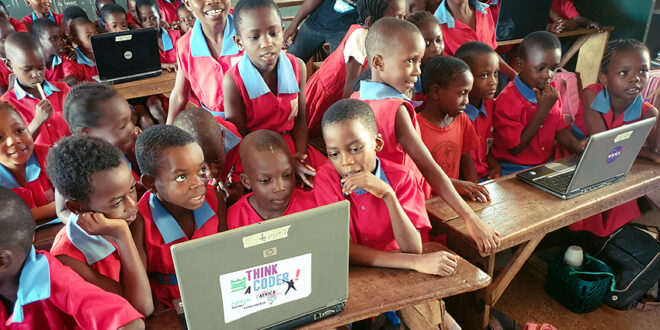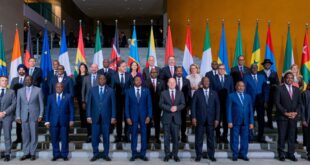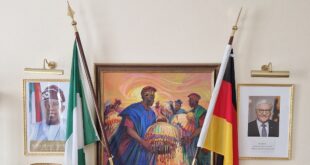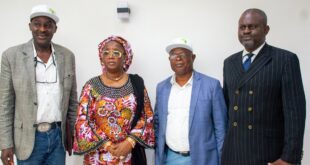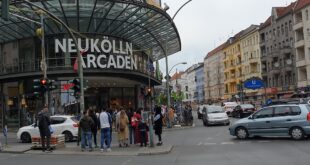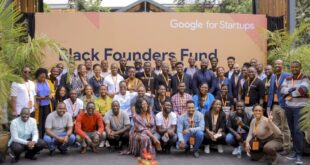How to deploy digital solutions to drive post-Covid African recovery was a major focus at the 2020 Global Partnership for African Development (G-PAD) forum, which took place on 27-28 November.
At a panel discussion on how digitalisation can help promote economic growth and development in Africa, entitled Digitization and Development: The African Perspective, Sunil Geness, Director for Global Government Affairs & CSR at SAP Africa, noted that the health crisis had widened the digital divide and increased efforts had to be made to close the gaps.
“For Africa and the Global South, generally, we need to move beyond consumption,” he said at the 2-day virtual conference, whose theme was Strengthening Ties and Building Bridges for Recovery and Growth.
“Tech is an amazing enabler; it’s left to us to create the human potential to be able to take advantage of technology and innovation.” And creating the human potential is by preparing young people to participate in the digital economy through education and training, the SAP executive explained.

Geness talked about the products of his company which, he said, enables young people to connect during the pandemic as an example of the importance of digital solutions. He also mentioned Africa Code Week, an annual training programme organised by SAP Africa to equip African youths with the skills that enable them “to participate in the global economy beyond consumption”. Another of the company’s initiative, Code the Curve, in partnership with UNESCO, aims to find digital solutions to some of the problems facing the world, he said.
In his own submission, Engr Ifeanyi F. Ogochuckwu, Chief Technology Strategist, Debbie Mishael Group, South Africa, said the Covid-19 pandemic amplified the need for digital solutions, as the pandemic had exposed the vulnerabilities of the continent.
Ogochuckwu, who is also a member of the EC-Council Global Advisory Board for CND, said the challenge now was how to deploy digital solutions against the problems facing the continent.
He noted the advances that have been made in mobile digital payments, but they hadn’t gone far enough for a transformative impact when viewed against the size of the population of the continent.
The IT expert listed the main challenges facing the deployment of digital solutions, including low digital literacy and the wide digital divide between urban and rural Africa. However, Africa with its high youth population was well placed to adopt digital solutions, he said.
Ogochuckwu mentioned education on demand and e-commerce as areas where digital solutions could be deployed for sustainable impact on development.
He called for the adoption of digital solutions that have worked elsewhere and apply them to the specific problems facing the continent.
The role of government, according to the IT expert, is to create macroeconomic conditions that support digital transformation. “Policy has a crucial role to play,” he said, to create the enabling environment.

Africa’s education system should be reformed to promote a culture of critical thinking and problem-solving among young people, with emphasis on science, technology, engineering and mathematics (STEM), Ogochukwu said. He also called for the teaching of STEM in local languages as it would enable rapid learning.
The Nigerian-born expert said the high cost of data was another major hindrance to the wide adoption of digital solutions and that governments, working with the telecom providers, had to work together to solve the problem. “Data cost is too high in Africa; we have to reduce it to enable more access to digital applications.”
Ogochukwu also called for the creation of digital hubs in rural areas to encourage young people to become interested in technology as a way to bridge the urban-rural digital divide in the continent.
Moderated by Laura S. Kauer García, Human Right Researcher and MA candidate at the School of Advanced Studies (SAS), University of London, the panel discussion reveal the huge potential of technology to support growth and development on the continent.
Organised by Lead Africa International e.V., a Germany-based global non-governmental organization dealing with development issues, G-PAD 2020 holding on 27-28 November focuses “on establishing and reinvigorating multilateral cooperation with Africa for growth and development” post-Covid.
Femi Awoniyi
 THE AFRICAN COURIER. Reporting Africa and its Diaspora! The African Courier is an international magazine published in Germany to report on Africa and the Diaspora African experience. The first issue of the bimonthly magazine appeared on the newsstands on 15 February 1998. The African Courier is a communication forum for European-African political, economic and cultural exchanges, and a voice for Africa in Europe.
THE AFRICAN COURIER. Reporting Africa and its Diaspora! The African Courier is an international magazine published in Germany to report on Africa and the Diaspora African experience. The first issue of the bimonthly magazine appeared on the newsstands on 15 February 1998. The African Courier is a communication forum for European-African political, economic and cultural exchanges, and a voice for Africa in Europe.

